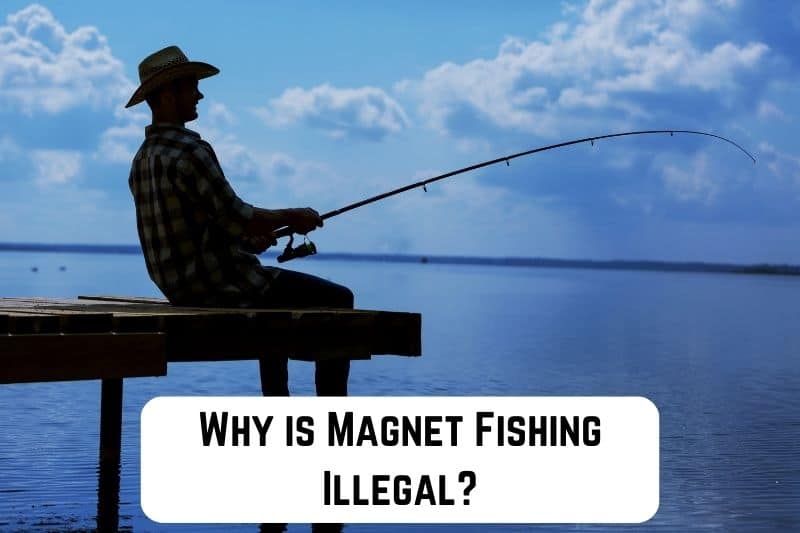In recent years, magnet fishing has gained much attention and is growing in popularity. Although there aren’t any official magnet fishing laws currently because it’s a relatively new pastime, there are still broad guidelines that one should abide by.
It’s crucial to know whether magnet fishing is permitted where you live and to confirm that there are no fines or penalties applicable to you in your community. Most areas permit magnet fishing; however, you may need to know a few exclusions.
Read: Smart Home: Components, Examples & Challenges
What is Magnet Fishing?
A strong magnet is attached to the end of a rope and thrown into a body of water as part of the activity known as “magnet fishing,” where the object of the hunt is to retrieve lost metal treasures. When anything is attracted to the magnet, the rope is gradually drawn in, lifting the object out of the water.
Any body of water, including rivers, lakes, and ponds, that has metal objects in it can be used for magnet fishing. Many magnet fishermen concentrate on locations with a good chance of discovering expensive items, like abandoned bridges, docks, and public spaces like parks or coasts.
The fact that magnet fishing is a cheap pastime with little equipment requirements is one of the explanations for why it has grown in popularity. You only need a rope, a powerful magnet, and a bucket or sack to gather your discoveries.
Boat owners have used this method for decades to recover misplaced keys or anchors that have fallen into the water. Still, in the past few years, more individuals have been interested in the excitement of unearthing hidden treasures beneath the surface of the water.
Why is Magnet Fishing Illegal?
Magnet fishing is prohibited in some areas due to its potential for harm, even though it can be enjoyable for people of all ages. Anything can be thrown into a body of water, including guns and bombs, and if you don’t know how to manage it, you could hurt yourself or other people.
- Environmental Impact: In certain regions, local government representatives can be worried about how disrupting the undersea ecosystem might affect the environment. Certain items, including old metal objects or abandoned materials, collected using magnet fishing may harm the ecosystem or aquatic life.
- Historical Artifacts: Historical artifacts or items with historical or cultural significance may be found using magnet fishing. Since laws about cultural heritage cover these objects, it is unlawful in many places to remove them without the necessary license.
- Local Regulations: Significant differences between jurisdictions regarding magnet fishing laws and regulations might exist. Specific locations may have rules or licenses governing this kind of behavior.
- Trespassing and Private Property: Magnet fishing may entail dipping magnets into water bodies, which may be situated on private property. Going magnet fishing on someone else’s land without their consent could be trespassing.

Reasons For Legal Restrictions
Magnet fishing and related activities are frequently subject to legal prohibitions for various reasons, including safety, environmental effects, historical significance, and property rights.
Here are a few typical justifications for legal limitations.
Environmental Concerns
Discovering the mysteries hidden in the ocean’s depths has long captured our interest. A simple experience, magnet fishing promises to reveal the hidden gems buried beneath the sea’s surface.
Disturbing Aquatic Homes
We might not be aware of the possible harm we could do when we throw our magnets into the ocean to find lost artifacts. The potent magnets can upend the tranquil habitats of marine life, much like underwater treasure hunters.
Fish, sea turtles, and other aquatic animals feel like you do when your comfortable area is abruptly disturbed. This disruption may negatively impact their capacity to survive in the undersea environment, which could have far-reaching effects on their habitats.
Endangering Aquatic Species
In our haste to find hidden gems, we may unintentionally jeopardize the species we seek to admire. There is a chance that ecosystems will be upset, putting aquatic life in jeopardy. Underwater communities are affected by magnet fishing in a variety of ways, ranging from microscopic species to more massive marine life.
Environmental agencies have quickly identified magnet fishing as an activity that may have long-term effects on aquatic biodiversity. These agencies are the watchful custodians of our aquatic habitats.
Safety Issues
We frequently become ignorant of the possible hazards lurking in the depths due to the allure of discovering secret riches beneath the water’s surface. A world of risks lies beneath the shimmering attraction of magnet fishing, some as sharp as the metal things we seek.
Unseen Hazards of the Deep
The same magnetic force that brings artifacts from the ocean floor to the surface may also reveal hidden dangers. What a shock it would be to pull out a relic and find an unexploded bomb, a weapon you forgot, or A pointy object waiting for you. These hidden threats, relics from a bygone era, or the outcome of human negligence increase the risk factor in this alluring journey.
Spearfishing Guns and Unseen Threats
Magnet fishing aficionados may accidentally discover more than just rusty relics in their search for buried gems. The ocean floor hides metal artifacts, but it’s possible to come across abandoned weapons like spearfishing rifles.
This unanticipated threat increases the safety hazards related to magnet fishing, highlighting the necessity of exercising caution and awareness below the water’s surface.
Historical Preservation
Magnet fishing raises serious concerns about cultural and historical preservation. Water bodies frequently hold items and relics with archaeological, historical, or cultural value. For the following specific reasons, legal limitations could be put in place during magnet fishing to protect cultural and historical heritage:
Protection of Artifacts
Water bodies can be storage facilities for historical artifacts, from modern, culturally significant items to tools and weaponry from antiquity. Legal limitations prevent these objects’ removal, destruction, or loss while magnet fishing.
Archaeological Sites
Archaeological sites submerged in water may retain valuable information about historical human civilizations. Magnet fishing can potentially disturb these sites, jeopardizing the authenticity of archaeological evidence and causing the loss of important recorded data.
Legality Regulations
Starting the allure of a lifetime treasure hunt beneath the seas entails a complex web of legal issues in addition to the excitement of exploration. Examine the legal ramifications of this benign behavior, as the magnet’s pull may result in artifacts and possible legal issues.
The Unintended Consequences
When it involves potential legal repercussions, magnet fishing—frequently motivated by the excitement of discovering misplaced artifacts—becomes more complicated. The magnetic pull can reveal a variety of objects, harmless or not, and the diversity of these objects puzzles law enforcement officials.
The eclectic mix of finds introduces a degree of ambiguity because some of the artifacts might be connected to illegal activity, which might transform an otherwise pleasurable activity into a legal minefield.
Legal Safeguards and Prohibitions
Some areas have taken a strong stand and completely banned magnet fishing in response to such worries. The objective is to prevent tampering with current investigations and improper treatment of possible evidence.
By highlighting the value of responsible exploration, this legal ban aims to balance the excitement of magnet fishing and the requirement to uphold the integrity of legal procedures.

Where is Magnet Fishing Illegal?
In the United States, magnet fishing is permitted, and many enthusiasts eagerly await their local magnet fishing opportunities. The only state that has made an exception is South Carolina, where magnet fishing is now prohibited.
Passed in 1991, the Underwater Antiquities Act prohibits “harvesting any archaeological remains from state waters lacking a license.” Obtaining these permits is also tricky and involves a lot of work. According to the University of South Carolina, a hobby license is required to magnet fish lawfully in the state.
Nevertheless, licenses for this activity are not granted by the state or its Institute for Archeology and Anthropology (SCIAA). The institution also refers to it as a “potentially destructive practice.”
While magnet fishing is permitted in public waters in most states, state law protects artifacts that cannot be removed. Magnet fishing on private land requires authorization from the landowner, and extra caution must be taken to avoid danger if you are harvesting items other than cultural relics, such as guns, grenades, and the like.
Read: Pros and Cons of a Heat Pump
Consequences of Illegal Magnet Fishing
Illegal magnet fishing can result in several legal issues, including breaking laws about the environment, culture, safety, and property. The repercussions for unlawful magnet fishing can be severe and even result in a prison sentence, particularly if you caught a firearm.
“I fished it out of a canal and didn’t know” is not a valid defense under the law and won’t hold up in court. A gun is just a gun. Not only can you go to jail or prison, but weapons could be loaded and ready to shoot without your awareness.
You run the risk of gravely hurting or killing yourself or other people if the gun goes off. Carrying a firearm without authorization has serious consequences, including a statutory minimum term of seven years.
Conclusion
Many people who are looking for new outdoor activities still find magnet fishing to be a popular activity. Sometimes, those who desire to go magnet fishing do so in search of riches and antiquities. Although no laws expressly forbid magnet fishing, you must obtain permission from the landowner to avoid being arrested for trespassing!






